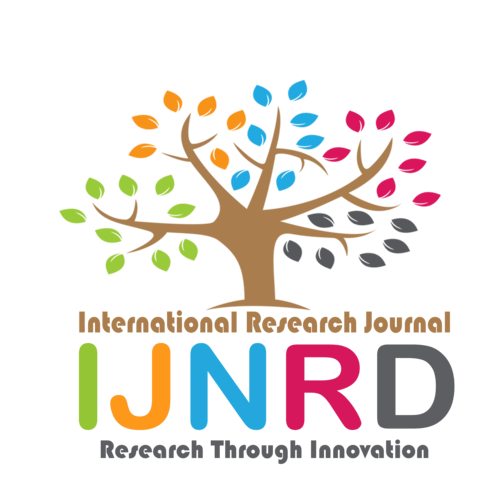|
|||||||||||||||

|
INTERNATIONAL JOURNAL OF NOVEL RESEARCH AND DEVELOPMENT International Peer Reviewed & Refereed Journals, Open Access Journal ISSN Approved Journal No: 2456-4184 | Impact factor: 8.76 | ESTD Year: 2016 Scholarly open access journals, Peer-reviewed, and Refereed Journals, Impact factor 8.76 (Calculate by google scholar and Semantic Scholar | AI-Powered Research Tool) , Multidisciplinary, Monthly, Indexing in all major database & Metadata, Citation Generator, Digital Object Identifier(DOI) |
||||||||||||||
Issue: May 2024
Volume 9 | Issue 5
Review Result and Publication of Paper within : 2-3 days
Click Here For more DetailsFor Authors
Forms / Download
Published Issue Details
Editorial Board
Other IMP Links
Facts & Figure
Impact Factor : 8.76
Issue per Year : 12
Volume Published : 9
Issue Published : 96
Article Submitted :
Article Published :
Total Authors :
Total Reviewer :
Total Countries :
Indexing Partner
Join RMS/Earn 300
Licence
This work is licensed under a Creative Commons Attribution-NonCommercial 4.0 International License







|
Published Paper Details
|
|
| Paper Title: | Ensembling Machine Learning-Based Hybrid Feature Vector and Adaptive Genetic Algorithms for Robust Android Malware Detection |
| Authors Name: | Mohammad Huzaif Anwar , Hanumanthakari Sai Sravya , Preet Sureshbhai Sojitra , Shiza Ahmad Khan , Hanfi Aziz |
| Download E-Certificate: | Download |
| Author Reg. ID: |
IJNRD_209129
|
| Published Paper Id: | IJNRD2311196 |
| Published In: | Volume 8 Issue 11, November-2023 |
| DOI: | |
| Abstract: | The proliferation of Android smartphones among consumers has fueled a rapid increase in malware attacks on the Android platform. Cybercriminals leverage technological advancements to actively create and distribute malicious content, posing a significant threat to users. While researchers have made considerable strides in generic Android malware detection, a deeper understanding of specific malware groups is essential for a more nuanced defense strategy. This paper addresses the critical challenge of Android malware detection by presenting a comprehensive solution that amalgamates static analysis of Android APKs with advanced machine learning techniques. Leveraging the recently introduced CICMalDroid 2020 dataset, our approach focuses on robust feature extraction, encompassing API Calls, Intents, Permissions, and Command signatures. To enhance classification accuracy, we employ a two-step methodology. Initially, we perform feature selection using Particle Swarm Optimization (PSO) on the dataset. Subsequently, we optimize the performance of XGBoost and CatBoost machine learning classifiers through an Adaptive Genetic Algorithm (AGA). Our experiments yield exceptional results, achieving a remarkable 99.175% accuracy and a corresponding F-score of 99.054 % with the ensembled XGBoost and CatBoost classifiers. This performance is attributed to PSO-based feature selection and AGA-based hyperparameter optimization. This research underscores the effectiveness of our hybrid approach, which seamlessly integrates static analysis with ensembled machine learning models and adaptive genetic algorithms. The proposed solution significantly enhances classification performance, demonstrating its potential for improved Android malware detection in real-world scenarios. The findings contribute to advancing the field of Android security and serve as a foundation for developing more targeted defenses against evolving malware threats. |
| Keywords: | Android Malware, Malware Detection, Machine Learning, Static Analysis, Feature Selection, CICMalDroid 2020 Dataset, Feature Extraction. API Calls, Particle Swarm Optimization (PSO), XGBoost, CatBoost. |
| Cite Article: | "Ensembling Machine Learning-Based Hybrid Feature Vector and Adaptive Genetic Algorithms for Robust Android Malware Detection", International Journal of Novel Research and Development (www.ijnrd.org), ISSN:2456-4184, Vol.8, Issue 11, page no.b751-b764, November-2023, Available :http://www.ijnrd.org/papers/IJNRD2311196.pdf |
| Downloads: | 000118754 |
| ISSN: |
2456-4184 | IMPACT FACTOR: 8.76 Calculated By Google Scholar| ESTD YEAR: 2016 An International Scholarly Open Access Journal, Peer-Reviewed, Refereed Journal Impact Factor 8.76 Calculate by Google Scholar and Semantic Scholar | AI-Powered Research Tool, Multidisciplinary, Monthly, Multilanguage Journal Indexing in All Major Database & Metadata, Citation Generator |
| Publication Details: |
Published Paper ID:IJNRD2311196 Registration ID: 209129 Published In: Volume 8 Issue 11, November-2023 DOI (Digital Object Identifier): Page No: b751-b764 Country: bengaluru, karnataka, India Research Area: Science & Technology Publisher : IJ Publication Published Paper URL : https://www.ijnrd.org/viewpaperforall?paper=IJNRD2311196 Published Paper PDF: https://www.ijnrd.org/papers/IJNRD2311196 |
| Share Article: | |
|
Click Here to Download This Article |
|
| Article Preview | |
|
|
|
Major Indexing from www.ijnrd.org
| Semantic Scholar | Microsaoft Academic | ORCID | Zenodo |
| Google Scholar | ResearcherID Thomson Reuters | Mendeley : reference manager | Academia.edu |
| arXiv.org : cornell university library | Research Gate | CiteSeerX | PUBLON |
| DRJI | SSRN | Scribd | DocStoc |
ISSN Details
 |
 |
ISSN: 2456-4184
Impact Factor: 8.76 and ISSN APPROVED
Journal Starting Year (ESTD) : 2016
DOI (A digital object identifier)
Conference
Open Access License Policy
Important Details
Social Media
| Copyright © 2024 - All Rights Reserved - IJNRD |












Facebook Twitter Instagram LinkedIn